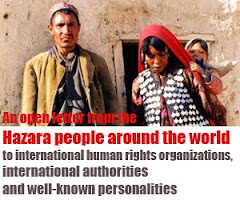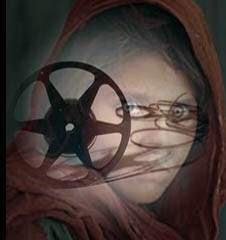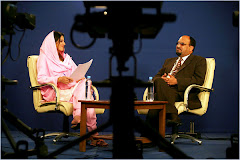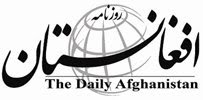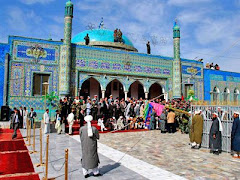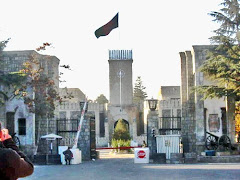Hanif Elham,
• Editor, writer producer for ATN ( Ariana Television Network)
• Producer/ director for the show Booye Maah ( literary and cultural program on ATN)
• Broadcast Journalist for Ariana FM 93.5 MHZ (Kabul)
• Writer, researcher and adviser for Deedenow Cinema Production Afghansitan
• Editor in chief for the website of and a member of board of Directors of Academy of Art and Cinematic Education
Since the number of battles and suicide attacks have been increasing day by day as a result of the Taliban’s re-empowerment, life is getting more difficult for the Afghans, especially the intellectuals and the media activists.
Reports show the year 2007 has been the worst year for the security situation since the establishment of the interim government of Afghanistan.
Recently, while I have been in exile I heard that Hanif Elham a colleague of mine in ATN, Deedenow Cinema , and the Academy of Art has been threatened to death by the Taliban. Mr. Elham is a broadcast journalists who has been working day and night in Afghanistan for freedom of speech, human rights, and democracy.
Mr. Elham has been threatened and intimidated because of his popular radio program on Ariana Radio, “Imroz dar Tarikh” or in “Today in History” that presents news stories of what had occurred on the same date in previous years.
As a result of more than two years’ hard work and research, Mr. Elham has been able to collect reports that detail the destruction and killings perpetrated by the Taliban during the five years of their rule. They describe their cruelty, massacres, and hidden relationships with the other countries like Pakistan.
Mr. Elham interviewed eye-witnesses, and collected personal diaries, and newspaper clippings. He has been able to write what the Taliban did on every single day of their reign.
This remarkable effort for democracy and justice made his program unique and popular.
After a few months, in almost every house where Radio Ariana had coverage, people listened to this program each morning from 6:30 to 7:00.
As a voice for victims of human rights violations, Mr. Elham received many thoughtful and appreciative letters and calls. The program’s popularity alarmed the Taliban. They did not tolerate a voice revealing the truth about them, so they called him and threaten him with death. Mr. Elham continued, so they sent him warning letters. Mr. Elham has ignored the threats and continues his work for an unknown period of time, even though he knows it is not safe for him and his family.
Hanif Elham is sure that there is always need of sacrifice, to nourish the tree of democracy and justice in a post-conflict country like Afghanistan. Now it is our responsibility as media activists to become a voice for him and support his continuing work, which is the will of the majority.
Let us all become a strong voice that speaks about his situation to the people of the world. Let us all once again take an oath not only for Hanif Elham but everyone who stands for democracy, and does the brave work of bringing the rule of law to a country where there has been none for decades.
Undoubtedly, one of the ways to stop this intimidation, which has become a new strategy for the Taliban and the extremists of Afghanistan, is to form a strong network worldwide. It is important to reach out to the world and ask the International Community to find ways for safety and protection of journalists and media workers not only in Afghanistan but all over the world.
Let us all become one voice, condemn these threats and intimidation. Let us pray for the safety of Hanif Elham. Let us reveal the work of the Taliban and extremists around the world.
Thursday, November 8, 2007
Monday, November 5, 2007
Misuse of the death penalty in Afghanistan
Misuse of the death penalty in Afghanistan
by Amin Wahidi
Recently Afghans witnessed that fifteen human beings were executed after being tried by the judicial authorities of Afghanistan. Among those fifteen, some were accused to be murderers, some drug traffickers and some kidnappers who all faced the extreme penalty, death by hanging. This was shocking news for a young Afghanistan that practices democracy as a herald for peace, fairness and justice and for which it has the support of international community.
Since the collapse of the pro-communist government and empowerment of the Mujahedeen in 1991 there has been chaos throughout Afghanistan. The government became an Islamic state and the courts had to operate based on Sharia (the Islamic law), but there was not an appropriate court where a person could address his legal problem and find justice. Like in the jungle, the wealthiest and most powerful were the law.
As a result, when people face a serious legal problem, they do not know where to turn. They do not see that a court can solve their problem through a fair legal process.
In the chaos of the civil war, every Jihadi commander had his private court (which was his commandant station) and his guns and soldiers were the executive force and tool to enforce his decisions. Many people were jailed, tried, tortured, and even killed but there was nowhere to complain about it and no one could dare to discuss or object to it. For several years it was like this and a generation grew up with no rule of law and no justice in the country.
The point here is whether the sentence for the recently executed people was fair. Many people believe that our judicial branch, from primary to the Supreme Court are corrupt with bribery, bias, and influence by warlords.
People believe that if the government really wants to bring justice to Afghanistan, it must start the huge process of investigating and prosecuting those whose hands are contaminated by innocent people’s blood. Many people are still suspected of committing serious crimes against humanity, or of betraying the national interest. They need to face justice, but that does not happen because of their relationships with senior government officials, cabinet members, or former Jihadi leaders.
Many Taliban have committed crimes such as beating and stoning innocent or raped women. Innocent people including women were massacred, and many more crimes were committed when they were in power. But they are still free, enjoying their life as if they have done nothing wrong at all, only because they are from a particular area or particular province.
This essay is not to defend criminals who have committed serious crimes and faced the death penalty. I only ask for general for transparency in the trials of accused persons, so that in punishment there will not be discrimination.
I am concerned that there is not clarity and transparency in the trials of the criminals or people accused of a crime. When the government, acting officially or not, misuses the death penalty as a tool against political opposition, free media activists and whoever observes and criticizes misdeeds of the administration, this is a problem.
Iran and China are famous worldwide for using the death penalty of hanging for opposition or anti- government political activists in their country. Afghanistan must not join them in this.
War criminals and present and former Taliban commanders are forgiven or exempted from any kind of prosecution. They are welcomed to get their share of power in the government, but poor, petty criminals who have broken the law for reasons of poverty, hunger, unemployment or mental disorder face the extreme penalty.
The USA, the biggest supporter for Afghanistan, still has the death penalty in some States. Even there, the fairness of the death penalty is questioned by many. Most countries supporting Afghanistan (primarily European) have completely removed the death penalty.
Afghanistan should remove the death penalty and join the progressive international community, because it is so unfairly handed out as a political tool, not as punishment for crimes. But it doesn’t seem this will occur soon, since the president’s spokesperson recently announced that executions will continue in our country.
editorial assistance from Robert Maier
by Amin Wahidi
Recently Afghans witnessed that fifteen human beings were executed after being tried by the judicial authorities of Afghanistan. Among those fifteen, some were accused to be murderers, some drug traffickers and some kidnappers who all faced the extreme penalty, death by hanging. This was shocking news for a young Afghanistan that practices democracy as a herald for peace, fairness and justice and for which it has the support of international community.
Since the collapse of the pro-communist government and empowerment of the Mujahedeen in 1991 there has been chaos throughout Afghanistan. The government became an Islamic state and the courts had to operate based on Sharia (the Islamic law), but there was not an appropriate court where a person could address his legal problem and find justice. Like in the jungle, the wealthiest and most powerful were the law.
As a result, when people face a serious legal problem, they do not know where to turn. They do not see that a court can solve their problem through a fair legal process.
In the chaos of the civil war, every Jihadi commander had his private court (which was his commandant station) and his guns and soldiers were the executive force and tool to enforce his decisions. Many people were jailed, tried, tortured, and even killed but there was nowhere to complain about it and no one could dare to discuss or object to it. For several years it was like this and a generation grew up with no rule of law and no justice in the country.
The point here is whether the sentence for the recently executed people was fair. Many people believe that our judicial branch, from primary to the Supreme Court are corrupt with bribery, bias, and influence by warlords.
People believe that if the government really wants to bring justice to Afghanistan, it must start the huge process of investigating and prosecuting those whose hands are contaminated by innocent people’s blood. Many people are still suspected of committing serious crimes against humanity, or of betraying the national interest. They need to face justice, but that does not happen because of their relationships with senior government officials, cabinet members, or former Jihadi leaders.
Many Taliban have committed crimes such as beating and stoning innocent or raped women. Innocent people including women were massacred, and many more crimes were committed when they were in power. But they are still free, enjoying their life as if they have done nothing wrong at all, only because they are from a particular area or particular province.
This essay is not to defend criminals who have committed serious crimes and faced the death penalty. I only ask for general for transparency in the trials of accused persons, so that in punishment there will not be discrimination.
I am concerned that there is not clarity and transparency in the trials of the criminals or people accused of a crime. When the government, acting officially or not, misuses the death penalty as a tool against political opposition, free media activists and whoever observes and criticizes misdeeds of the administration, this is a problem.
Iran and China are famous worldwide for using the death penalty of hanging for opposition or anti- government political activists in their country. Afghanistan must not join them in this.
War criminals and present and former Taliban commanders are forgiven or exempted from any kind of prosecution. They are welcomed to get their share of power in the government, but poor, petty criminals who have broken the law for reasons of poverty, hunger, unemployment or mental disorder face the extreme penalty.
The USA, the biggest supporter for Afghanistan, still has the death penalty in some States. Even there, the fairness of the death penalty is questioned by many. Most countries supporting Afghanistan (primarily European) have completely removed the death penalty.
Afghanistan should remove the death penalty and join the progressive international community, because it is so unfairly handed out as a political tool, not as punishment for crimes. But it doesn’t seem this will occur soon, since the president’s spokesperson recently announced that executions will continue in our country.
editorial assistance from Robert Maier
Subscribe to:
Comments (Atom)






